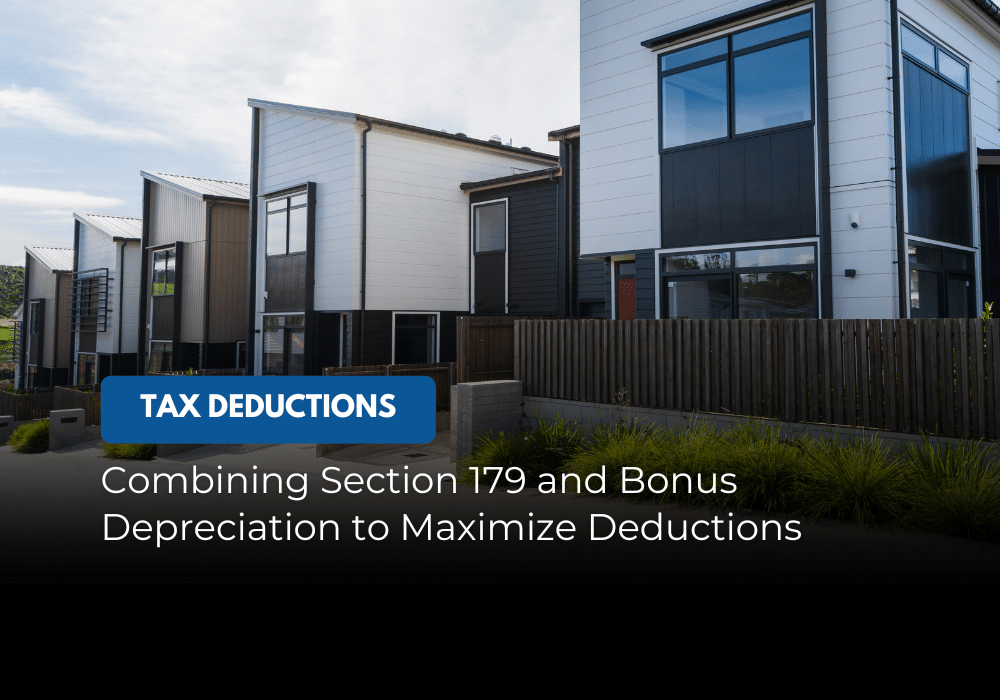Navigating tax legislation can be complex, and waiting for the perfect moment to act can be a costly mistake. This is especially true when it comes to bonus depreciation, a powerful tool for property owners and real estate investors to offset tax liabilities and maximize deductions. As we face uncertainty surrounding possible legislative changes to bonus depreciation, it’s crucial to take advantage of the benefits available now rather than waiting for potential legislative changes that may or may not happen.
The Current State of Bonus Depreciation
In January, the House approved proposed legislation to reinstate 100% bonus depreciation retroactively for the 2023 tax year and extend it through 2024 and 2025. However, with the Senate’s recent rejection of the bill, the future of these provisions is uncertain. As a result, many property owners and CPAs are taking a “wait and see” approach, hoping that a revised bill could be introduced next year.
Why You Should Act Now
Currently, all indications point to a reluctance by Republicans to move forward with the current bill, as they prefer to wait until after the November elections in anticipation of the possibility of enacting a more comprehensive tax reform bill. This approach by Republicans cast doubt on any legislative changes occurring this year. As such, it is unlikely that any change to the bonus depreciation rules will be retroactive to the 2023 tax year and, rather, will be applicable to tax years 2024 and later.
Combining Section 179 and Bonus Depreciation
Property owners who extended their 2023 tax filing in hopes of the return of 100% bonus depreciation should move forward using the two options available to maximize their accelerated first-year depreciation deductions, Section 179 expensing and 80% bonus depreciation.
Using Section 179 and bonus depreciation together can maximize your immediate tax benefits. Here’s how you can strategically use both:
- Apply Section 179 First: Deduct as much as you can using Section 179. This allows you to maximize the amount deducted up to the limit.
- Use Bonus Depreciation Next: After applying Section 179, use the 80% bonus depreciation to deduct a significant portion of the cost of remaining property.
Understanding Section 179 Expensing
Many property owners have overlooked Section 179 deduction rules, focusing instead on bonus depreciation. Section 179 of the IRS Code allows businesses to deduct the full purchase price of qualifying property purchased or financed during the tax year. This deduction is available whether the equipment is new or used, as long as it is new to you.
Key Points of Section 179:
- Deduction Limit: For the 2023 tax year, the maximum deduction limit is $1,160,000. This means you can deduct up to this amount of the total cost of qualifying purchases.
- Spending Cap: The deduction begins to phase out dollar-for-dollar after $2,890,000 is spent on qualifying equipment. The deduction is completely eliminated if your total purchases exceed $4,050,000.
- Qualifying Property: Most tangible personal property used in a trade or business, whether new or used. Additionally, certain improvements made to non-residential real estate, including roofs, HVAC systems, and qualified leasehold improvements.
Understanding Bonus Depreciation
Bonus depreciation is a tax incentive that allows businesses to immediately deduct a significant percentage of the purchase price of eligible assets in the year they are placed in service, rather than depreciating them over their useful lives. This accelerated depreciation method is designed to encourage investment by providing immediate tax benefits, improving cash flow for businesses. It applies to a wide range of assets, including machinery, equipment, and certain improvements to non-residential real property. By enabling faster recovery of costs, bonus depreciation helps businesses reinvest savings into growth and operations.
While the drop to 80% might seem like a reduction, it’s still a substantial benefit. You can write off 80% of your property’s cost in the first year, with the remaining costs recovered over the subsequent years. This immediate write-off provides significant tax relief and can improve your cash flow.
2023 Tax Returns
If you haven’t conducted a cost segregation study or filed for 2023, now is the time to act. Cost segregation studies break down your property into various components, allowing you to identify assets eligible for accelerated depreciation. Here’s why this matters:
- Amendable returns: If legislation changes, you can always amend your return to take advantage of new rules.
- Strategic benefits: Cost segregation has been beneficial long before bonus depreciation was introduced, offering significant tax savings, especially in the first five years.
Planning for the Future
If bonus depreciation continues to phase out, building owners and their CPAs will need to strategize effectively. Combining bonus depreciation with Section 179 deductions can offer a comprehensive approach to maximizing tax benefits.
Here’s what to consider:
- 5/7-Year Assets: Utilize your cost segregation study to identify assets that qualify for accelerated depreciation.
- Combination Strategies: Work with your CPA to develop a strategy that incorporates both bonus depreciation and Section 179 deductions.
- Long-Term Planning: Even if legislation changes, having a solid depreciation strategy in place ensures you’re prepared for any eventuality.
Helpful Resources
For more detailed guidance and to calculate potential savings, visit Section179.org, which offers a helpful calculator and additional resources.
Final Thoughts
In the realm of tax legislation, waiting can often lead to missed opportunities. The current 80% bonus depreciation offers substantial benefits that should not be overlooked. By conducting a cost segregation study and collaborating with your CPA, you can ensure that you’re making the most of the available deductions now. Remember, it’s always possible to amend your return if future changes occur, but the advantages of acting today can significantly enhance your tax strategy and financial position. Don’t wait—move forward and take control of your tax planning today.
Contact us today to learn more or to request a no-cost benefit analysis for your property.


















